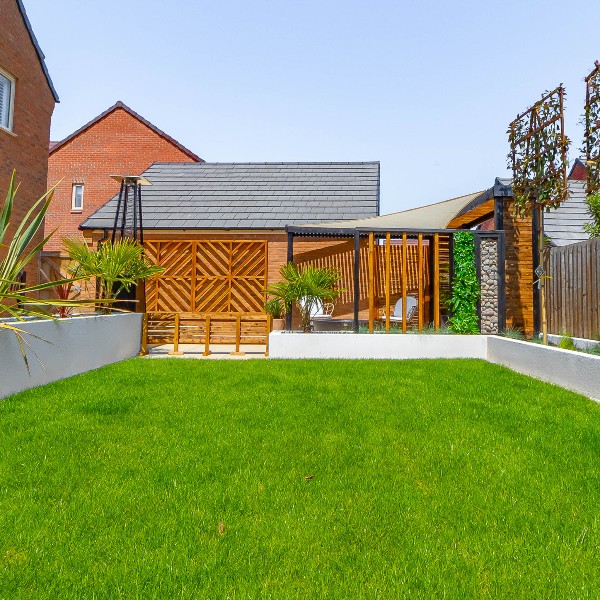- Turf
- Artificial
- Soil
- Timber
- Composite Decking
- Paving & Stone
Get In Touch With Our Experts Today!
Give us a Call! - Seed & Fertiliser
- Dressing
- Bark

July 11, 2024
When it’s time to revamp your lawn, where do you begin? You’ve chosen your high quality turf, but how many rolls do you need to complete the project? Gardens come in various shapes and sizes, so there’s no one-size-fits-all formula.
Once your space is prepared, it’s time to measure, but the approach will differ based on the lawn’s shape. This article will guide you through simple methods to accurately measure different types of lawns.
Whether it’s a small domestic garden or a professional football pitch, you need you know the specifications of your project before you can start.
To determine how many rolls of turf you need, start by calculating the area to be covered. Measure the length and width of the area. For circular areas, measure the diameter at the widest point. Use meters for measurements to avoid conversion errors. The fewer calculations, the fewer chances for mistakes!
Use our turf calculator to find out how many rolls you’ll need for any shape or size, from circular to straight edges. Always double-check your measurements and work in meters to easily convert them into square meters.
Gardens come in all shapes and sizes, so there’s no set formula. But there are easy ways to accurately measure the different types of lawns which we’ll talk about below.
To figure out how many rolls of turf are required, you need to know the size of the space you’re covering. You can then use our Turf Calculator to figure out the total about of turf required. Our turf calculator allows you to measure in metres, feet or yards – whichever unit you prefer. But how you measure the size of your lawn will vary from shape to shape.
Measuring Square or Rectangular Lawns
This is the most common lawn shape and an easy one to measure. Simply start by measuring the width and length of your lawn. You then multiply the width by the length to get the area in square metres.
Measuring Circular Lawns
Here, you’ll need to measure the lawn at its widest part (the diameter), then divide the answer by 2 to get the radius. Next, multiply the radius by itself and then by pi (which is 3.14). The formula looks like this: radius x radius x 3.14
Measuring Triangular Lawns
There is an easy formula for triangular lawns which is: width x height / 2
Start by measuring the longest side and then the height of the triangle. Next, multiply the longest side by the height of the triangle and divide the answer by 2.
Measuring Curvy Lawns
With these types of lawns, it’s always best to draw up a plan of the area, divide it into sections and measure each section. You can then calculate the area of each section separately and add them all together to get the total amount of turf needed.
How to measure video
George Davies wanted to give you a thorough but easy to follow, step-by-step guide, showing you how to measure your project before getting turf.
He breaks it down for the different types of gardens above.
Our rolls of turf measure 1.65m x 0.61m wide, which works out to 1 square metre per roll. This makes it quite easy when calculating how many rolls of turf your need for your project. We do recommend adding 5% to the final measurement to cover any amendments, shaping and cutting overlap.
It’s important to note early on that the cost of turf can vary depending on the type of turf you desire, the quality of the grass seed, the turf supplier, and the amount of rolls you require. We always recommend doing your research to ensure you’re investing in the correct variant of turf to match your soil type and end purpose. You’ll save time, frustration, and money in the long run if you invest in a high-quality turf that meets your garden project needs from the start.
When it comes to the different types of turf, the price often reflects the quality of the product, as well as what it’s made from and how it’s been cared for. Here at George Davies Turf, we have five different types of natural turf and six variants of artificial turf to meet your budget.
Natural turf costs:
Trident turf – from £3.40 per m² (as of 01/07/24)
Wildflower – from £20 per m² (as of 01/07/24)
Species Rich turf – from £19.50 per m² (as of 01/07/24)
Greens turf – from £8 per m² (as of 01/07/24)
RTF turf – from £7 per m² (as of 01/07/24)
Shade tolerant turf – from £25 per m² (as of 01/07/24)
Artificial turf costs:
Eco – from £26.50 per m² (as of 01/07/24)
Mira 4m – from £19.50 per m² (as of 01/07/24)
Virgo 4m – from £20 per m² (as of 01/07/24)
Folkstone – from £17.50 per m² (as of 01/07/24)
Putting Green – from £25 per m² (as of 01/07/24)
King – from £27.25 per m² (as of 01/07/24)
A cost-effective option is, of course, laying turf yourself. Although this takes time and careful planning, it’s a straightforward and successful solution when laying turf is done correctly. Read our helpful step-by-step on how to lay the perfect turf, or watch our video where George guides you through the process.
If you’re unsure how much turf to order for your gardening project, our friendly team are happy to help. Send us an email or call to discuss your turf options today.
CALL US NOW ON 01234 818 253